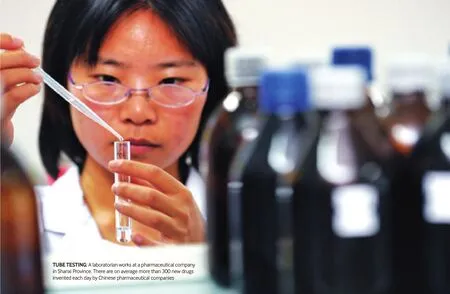Risky Bets
2013-12-06ByYuanYuan
By Yuan Yuan
Clinical pharmaceutical trials present a dilemma for China’s legal system

TUBE TESTING: A laboratorian works at a pharmaceutical company in Shanxi Province. There are on average more than 300 new drugs invented each day by Chinese pharmaceutical companies
Eighty-four-year-old Zhang Zuning has been in a seesaw battle with the well-known German pharmaceutical manufacturer Bayer Group for more than six years.
In October 2006, Zhang, a retired employee of Beijing-based Zizhu Pharmaceutical, agreed to participate in a clinical trial of rivaroxaban, an antiblood-clotting medicine manufactured by Bayer,when she was about to undergo artificial joint replacement surgery on her left knee in the Peking University People’s Hospital in Beijing. Zhang took the experimental anticoagulant, designated BAY59-7939, from October 23 to November 6.
On November 7, Zhang showed symptoms of acute shock during a routine preoperative x-ray of her veins. Deterioration of her condition forced her to return to the hospital the next day. According to the hospital, her complications may have been caused by the anticoagulant.
Bayer paid her less than 3,300 yuan($531) but denied her any further compensation, claiming the venogram caused the symptoms.
Canadian and EU authorities approved rivaroxaban in 2008 and the U.S. Food and Drug Administration approved it in 2011. It is marketed in some countries under the brand name Xarelto.
Zhang and her son, Liao Zhijie, sued Bayer and Peking University People’s Hospital and asked for 150,000 euros($192,300) in compensation. In February 2013, the Chaoyang District Court in Beijing ordered Bayer to pay 50,000 euros ($64,100)to Zhang, who was not satis fied and decided to lodge an appeal.
“The compensation is quite low and Bayer refused to reveal the insurance items they signed with the insurance company,”Liao said. “What we know is that the highest compensation would be half a million euros if the subject has an accident.”
Helpless subjects
It is not the first time for pharmaceutical test subjects in China to be in the public eye.Medicine produced by American pharmaceutical company P fizer was implicated in the death of Beijing resident Wang Liying in 2007.
Wang was diagnosed with terminal gastric cancer in Beijing’s Ditan Hospital in 2006 at the age of 54.
She was running out of options. In March 2007, the hospital suggested she take part in a clinical trial of a new medicine from P fizer called SU011248.
Pfizer told Wang that the drug needed to be tested on gastric cancer patients and had already proven effective on other cancers.
Before signing a 41-page agreement,Wang and her husband Shi Deyong researched the potential side effects of the drug. “We received documents saying there are very rare possibilities for patients to have a sharp decrease in blood platelets, which might cause death,” Shi said. “The agreement said they would provide compensation for the negative effects of the medicine but didn’t provide details of how much.”
This rare possibility happened to fall on Wang, who died one month later of a cerebral hemorrhage. Shi then sued Pfizer and the Ditan Hospital for the accident and a court ruled in 2011 that P fizer should pay Wang’s family 300,000 yuan ($48,270) in compensation.
Wang Yue, a health law professor at Peking University, revealed that there are about half a million Chinese test subjects participating in clinical trials for more than 800 new drugs every year. Western pharmaceutical companies are a major source of demand for the trials.
“It is a lot cheaper to conduct drug trials in developing countries, such as India and China,” Wang said. “The compensation when an accident occurs is much lower than that in developed countries, and they can find a huge number of subjects, especially rural residents, who have seldom received medical treatment before.”
Make or break
Statistics from China’s drug safety regulator show there are on average more than 300 new drugs invented each day by Chinese pharmaceutical companies and there is a great demand for pharmaceutical test subjects.

A FOREIGN GIANT: American drug maker P fizer is implicated in the death of a Beijing resident who participated in a clinical trial of new medicine from the company in 2007
In August 2002, Beijing-based China-Japan Friendship Hospital became the first Chinese hospital to publicly recruit test subjects. Hospitals in Shanghai, Nanjing in Jiangsu Province and Hangzhou in Zhejiang Province followed.
“Many people think test subjects in clinical trials are like lab rats. This prejudice stops many people from participating,”said Jiang Xiangjun, a doctor at Qingdao Hospital in Shandong Province. In 2005,Qingdao Hospital became the first hospital in Shandong to conduct clinical trials of pharmaceuticals.
“Before a new medicine is put on the market, it has to go through testing on animals and human beings,” said Jiang, who added that for the testing on human beings,they first test on healthy people and then on patients. “But now in many cases, only patients who are at the verge of death are likely to accept experimental drugs as a last hope.”
A patient surnamed Shao with acute cirrhosis of the liver tried an experimental treatment for cirrhosis-related accumulation of fluid in the abdomen in September 2011 with two other patients.
“I was desperate and would have tried anything, so I didn’t hesitate when the doctor suggested I take an experimental drug,”Shao said. He had already written his last will and testament and asked his family to make funeral preparations, but he made a nearly complete recovery in only 10 days. Now he is back to his normal life and plans to drive around the country on his own.
Liu Zhigang has taken part in testing of hepatitis B treatments for four years. “To be frank, I participated partly because I could get free treatment,” said Liu, revealing orthodox treatments left him nearly penniless.
“Economic concerns are the main motivation for test subjects,” Jiang said. Actually,the fact that drug companies pay for healthy people to get involved has made participation in clinical pharmaceutical trials a parttime job for some people, if not a career.
Yu Po, a 29-year-old man from Taian,Shandong Province, first learned about clinical trials at Ganji.com, a popular job posting website, and applied without hesitation, not entirely aware of what he was signing up for.
Near the end of 2010, the Beijing Proswell Medicine Co. offered Yu the opportunity to earn 10,000 yuan ($1,609) in a 100-day trial of an experimental anti-tumor medicine.
Only two minutes after being injected with a 2-mg dose of the medicine, Yu’s body reacted with cardiac arrhythmia, headache,thirst and a fever of 38 degrees Celsius.
“I did more than 50 EKGs (electrocardiograms) within two months, and none showed that I was as healthy as before,” Yu said.“Those drugs that we tried may not show side effects that quickly and obviously, but as time passes by, subjects might find that they are not as healthy as before.”
“In China, laws and regulations on human test subjects are still in chaos,” said Fan Haoxin, Executive vice Secretary General of the National Association of Health Industry and Enterprise Management. “The latest regulation in this field is the September 2009 Good Clinical Practice for Drugs. It claims that the test subjects can get compensation for damages caused during clinical trials, but doesn’t clarify who will be responsible to pay or how much the test subjects can get.” ■
